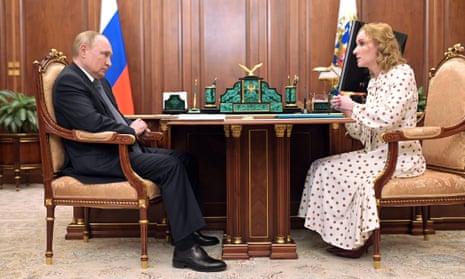A fresh wave of sanctions against Russia has been imposed by the government, as the UK signalled its disapproval of the Russian abduction of Ukrainian children into Russia, by aiming new sanctions at people involved with the “barbaric treatment of children in Ukraine”.
Those targeted by sanctions include the Russian children’s rights commissioner, Maria Lvova-Belova, the so-called mastermind behind the shadowy abduction programme.
Lvova-Belova has been accused by Ukraine of organising the capture of more than 2,000 vulnerable children taking then violently from the Luhansk and Donetsk regions and orchestrating a new policy to facilitate their forced adoptions in Russia.
Russia said in May that more than 190,000 children had arrived from Donbas, including about 1,200 from orphanages in the self-proclaimed republics in Donetsk and Luhansk. Russia said the vast majority were Russian-speaking or supporting, and that once they had found homes, they would be provided with Russian citizenship.
A raft of other Putin allies were issued with sanctions by the Foreign Office, including military commanders and Vladimir Mikhailovich, Patriarch Kirill, the head of the Russian Orthodox church.
The foreign secretary, Liz Truss, said: “Today we are targeting the enablers and perpetrators of Putin’s war who have brought untold suffering to Ukraine, including the forced transfer and adoption of children. We will not tire of defending freedom and democracy, and keeping up the pressure on Putin, until Ukraine succeeds.”
Giving MPs an update on the state of the fighting, she said: “We are now approaching a critical moment. Russia is bombarding towns and cities in the east.
“Some outside Ukraine are questioning whether the free world can sustain its support and claiming that some are beginning tire of this war. The people of Ukraine do not have that luxury. Our answer must be clear. We will never tire of defending freedom and democracy. Russian aggression cannot be appeased.”
She betrayed British nervousness that the upcoming G7 summit in Germany may be used by those that support an early negotiated settlement that stops short of victory for Ukraine.
She said: “Through the G7 and Nato we are doing everything we can to strengthen Ukraine’s hand. We also need to make sure our Baltic friends and our Polish friends are involved. Sanctions must be kept in place while Russian boots are on Ukrainian soil.”
Others to face fresh British sanctions – mainly asset freezes and travel bans – include Sergey Savostyanov, the deputy of the Moscow city Duma and member of Putin’s political elite, and Alexey Isaykin, president and board member of Volga-Dnepr Group, a Russian transport company with significant air operations that is contracted by the Russian government to create air bridges that carry critical goods.
Four military colonels from the 64th separate motorised rifle brigade, a unit accused of killing, raping and torturing civilians in Bucha, have also been targeted with sanctions for the brigade’s role in Ukraine.
Members of the “Salvation Committee for Peace and Order” – an organisation collaborating with the Russian army to support the occupation of the Kherson oblast, have also been targeted with sanctions.
In an attempt to show the links between Russia and other authoritarian regime, the Foreign Office also imposed sanctions on Russian organisations responsible for supplying aircraft parts to the Myanmar armed forces.
The precise number of children – many of them orphans – who are being abducted is unclear, but Ukraine has claimed the number is higher than 100,000. In what amounts to a form of modern slavery those abducted have been taken to the Vladimirskaya, Omskaya and Chelyabinskaya oblasts of Russia and the eastern island of Sakhalin, Ukraine claims. Some of the children were relocated from Mariupol to Donetsk (temporarily occupied by Russia) and then further to Taganrog in Russia. Russia tries to justify the illegal displacement of children as “taking care” of orphans.
Last week the head of Ukraine’s mission to the OSCE, Yevhenii Tsymbaliuk, read out messages from children who had been abducted and wanted to return to their grandparents.
He claimed this was what is called Russia state policy: “First, they come to kill their parents, and then they take children away.” Ukraine claims 318 children have been killed in the war.
The Russian Orthodox church accused the UK of an absurd attempt to intimidate.
“Attempts to intimidate the primate of the Russian church with something or to force him to renounce his views are senseless, absurd and unpromising,” a spokesperson for the church, Vladimir Legoyda, said on Telegram. “The church – now especially – is the last bridge, a means of communication, which they are trying to destroy for some reason.
“This may be necessary only for those political forces that have the escalation of conflict and the alienation of peace as their important goal.”
